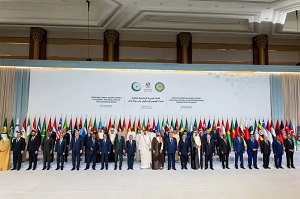EMV session highlights digital transformation opportunities, ICT sector challenges
The Jordan Times
AMMAN — Ministers, industry experts, and private sector representatives convened on Saturday under the Economic Modernisation Vision (EMV) to discuss strategic developments in Jordan’s information and communications technology (ICT) sector and preparations for its second executive programme, highlighting the Kingdom's role as a regional hub for innovation, digital talent and investment.
Minister of Digital Economy and Entrepreneurship Sami Smairat said the sector has benefited from the Kingdom’s political and financial stability, a strong banking system, and growing international confidence, providing a solid foundation for growth.
He also emphasised that Jordan’s strategic location, connecting Gulf countries to Europe, enables efficient cross-border data transfer and positions the Kingdom as a regional hub for ICT services.
Jordan has cultivated a knowledge-based economy, producing a skilled digital workforce through its education system and research-focused institutions, the minister noted, adding that between 2022 and 2024, employment in the ICT sector increased by 16.9 per cent, reaching 33,200 workers, or 2.1 per cent of total national employment.
"EMV projections indicate that employment must grow by 204 per cent, at an annual average of 13.2 per cent, to reach the 2033 target of 101,000 workers."
Smairat highlighted Jordan’s ambition to become a leading regional hub for technology adoption and innovation, positioning itself among the top three in the Middle East and within the top 20 internationally. "The Kingdom seeks to create an attractive ecosystem for digital entrepreneurship, leveraging modern infrastructure, bilingual talent, and cultural compatibility with both Arab and international markets."
The minister outlined several ICT-specific enablers and initiatives, including the Digital Inclusion Policy 2025 to ensure equitable access to digital services, the National Future Stations Strategy 2025, and the Blockchain Policy 2025. "Legal and regulatory measures include amendments to the Electronic Transactions Law 2015 and the Virtual Assets Law. Digital infrastructure projects include the digitisation of 1,679 government services, the updated SANAD platform, activation of 1.8 million digital IDs, the electronic passport project, and new portals at Queen Alia International Airport."
Additionally, the government has advanced digital platforms for healthcare and education and rolled out 5G commercially across several governorates. The national invoicing system (phase 2) has also been developed, and youth training programmes in digital skills have benefited 26,688 participants so far.
The EMV identified structural challenges that could limit growth, including limited venture capital, slow implementation of regulatory frameworks, gaps in intellectual property protection, fragmented data infrastructure, limited advanced analytics, skills mismatches in AI, cybersecurity, cloud computing, and IoT, high energy costs, and bureaucratic delays in licensing. Weak export readiness, due to limited international marketing and financing support, also restricts growth and competitiveness.
As part of the EMV’s second phase, Jordan has launched initiatives linked to six strategic goals. These include expanding markets and boosting digital exports through national branding and export programs, developing a qualified digital workforce, and establishing a National Innovation and Development Fund to support startups and technology companies from prototyping to commercialisation. Additional goals focus on enhancing global competitiveness in ICT, attracting venture capital, creating innovation hubs, and positioning Jordan as a regional leader in high-tech development.
Supporting these goals, 11 priority initiatives have been introduced, including the establishment of a national AI and data authority, acceleration of government digital transformation, creation of startup incubation hubs, implementation of green energy solutions for data centres, improvement of investment incentives, fostering venture capital, and launching regulatory sandboxes for emerging technologies.
Through these measures, Jordan aims to solidify its role as a leading regional ICT hub, drive knowledge-based economic growth, expand digital exports, and create high-value jobs in the sector, while continuing to address skills gaps, regulatory improvements, and investment attraction to meet the 2033 EMV vision, the minister said.
Latest News
-
 Arab-Islamic Summit issues final statement, condemns Israeli attack on Qatar, calls for accountability
Arab-Islamic Summit issues final statement, condemns Israeli attack on Qatar, calls for accountability
-
 King delivers Jordan's address at Emergency Arab-Islamic Summit in Doha
King delivers Jordan's address at Emergency Arab-Islamic Summit in Doha
-
 Leaders unite against ‘Israeli’ strike on Qatar at emergency Arab-Islamic Summit
Leaders unite against ‘Israeli’ strike on Qatar at emergency Arab-Islamic Summit
-
 Gaza’s death toll rises to 64,905: Health Ministry
Gaza’s death toll rises to 64,905: Health Ministry
-
 Rubio promises Netanyahu “unwavering support” to ‘Israel’ in Gaza goals
Rubio promises Netanyahu “unwavering support” to ‘Israel’ in Gaza goals